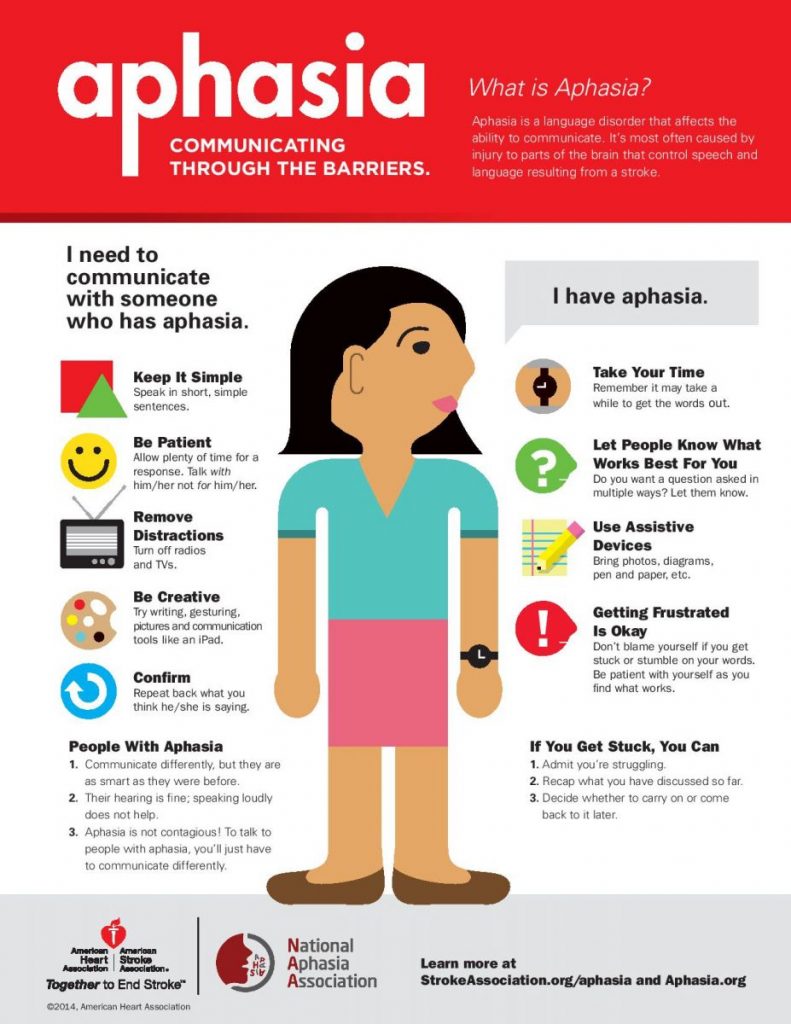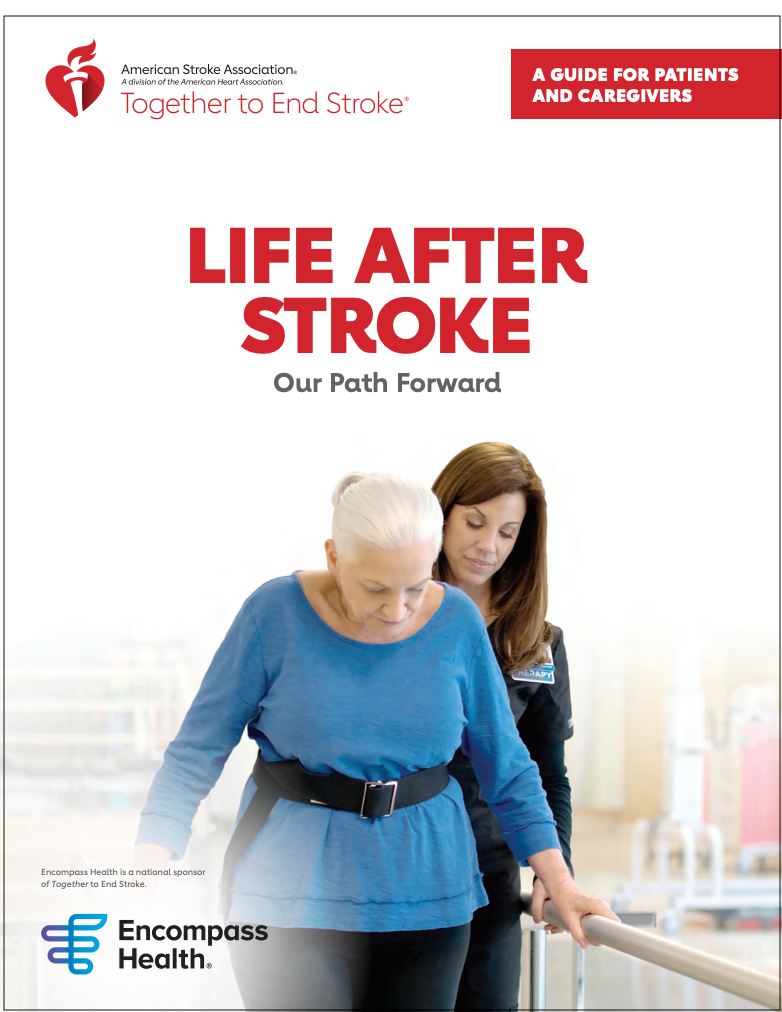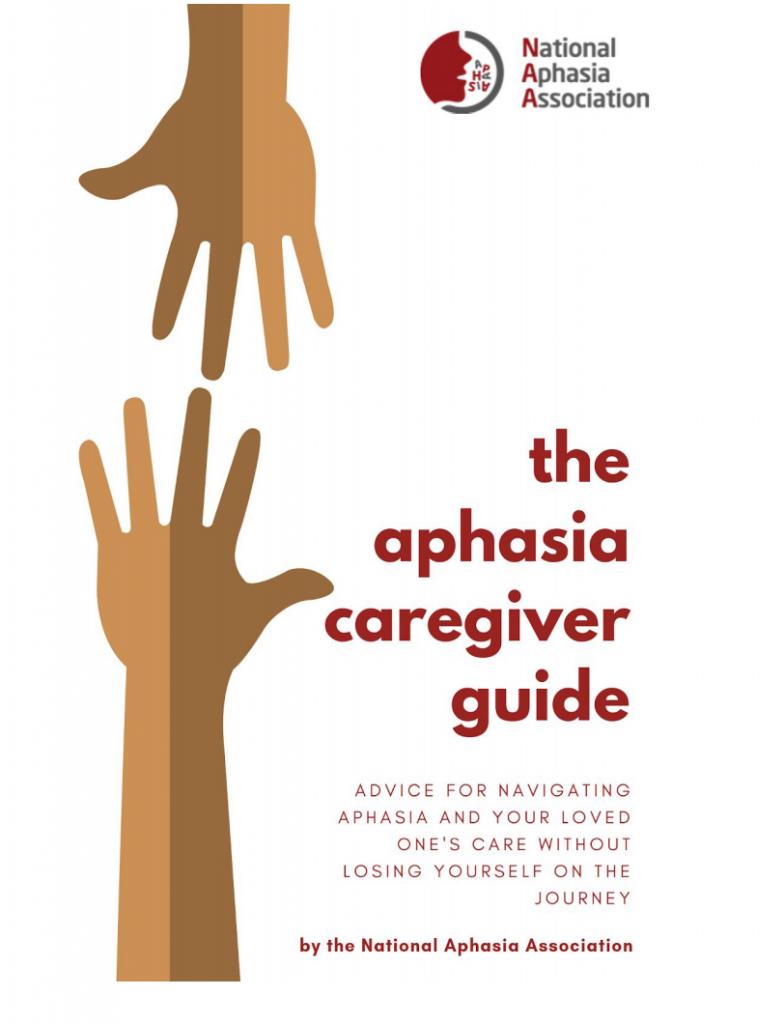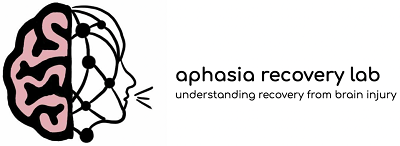We hope you find this information educational and helpful. The Aphasia Recovery Lab does not endorse the provided services.

Please click here to download this aphasia poster
Image courtesy of the National Aphasia Association Visit their website at https://www.aphasia.org/
Learn more about aphasia and the various resources available to you!
American Speech-Language-Hearing Association
ASHA is the national professional, scientific, and credentialing association for a variety of speech and hearing specialists. These include audiologists; speech-language pathologists; speech, language and hearing scientists; audiology and speech-language pathology support personnel, and students. Their mission is to make communication achievable by all. Their website includes more information on different communications disorders, including publications and events.
The National Aphasia Association
The National Aphasia Association is a non-profit organization. Its goal is to get readers in touch with research, education, rehabilitation, therapeutic and advocacy services. The website provides a compendium of resources for professionals, caregivers and people with aphasia.
The Pacific Stroke Organization is a non-profit organization, that has been serving Santa Clara and San Mateo counties since 1998. Its mission is to reduce the incidence of stroke through education. The Pacific Stroke Organization has resources for caregivers and people with aphasia such as events, support groups, and educational articles.
The American Stroke Association
The American Stroke Association has resources for stroke survivors, caregivers, and support group leaders. There is a Caregiver Guide to Stroke brochure containing tips and resources such as emotional support, medical management, effects of stroke, financial, legal, and health coverage. The American Stroke Association has a page dedicated to helping individuals find resources in the local area. On this page is also a guide for registering an already existing support group.
The Aphasia Center – Intensive Treatment Program
Located in Florida, the Aphasia Center Intensive Treatment program is the only private intensive aphasia treatment center in the world. The CEO is Dr. Bartels-Tobin and she created this center with the purpose of making and affordable intensive treatment option for people with aphasia. On this website is a section dedicated to caregivers. Here there are Aphasia Articles, Free Aphasia Tip Cards, Aphasia Wallet ID cards, Caregiver Stories, and Client and Educational Videos. Topics in this section range from “Can you go back to your job with aphasia?” to “Sadness and Depression in Aphasia”. Additionally, in this section are a series of 40 caregiver stories where a caregiver is recorded on a video highlighting an aspect of their journey interacting with someone with aphasia.
Brainline is a national multimedia project offering resources for those who’ve experienced a brain injury, for caregivers, and for Veterans. This website contains a resource directory where users can select their state to see which local options they have available. In addition to the individuals with TBI, the caregivers, and veterans, Brainline offers information for professionals such as online courses and research updates. Children with TBI have a dedicated section as well. The caregiver section list these topics: Caregiver Basics, Family Relationships, Caregiver Emotions, Staying Positive, Health & Self-Care, Legal & Finances, Military Caregiving, Caregiver Personal Stories & Blogs. These sections are videos and blog posts highlighting different aspects of caregiving such as motherhood, parenting, and fighting depression.
This is a list of stroke support groups in the Bay Area. Support groups are a great way to get to know other people with aphasia and practice communication in a friendly environment. Most groups are open to the public, but please contact the group organizer prior to coming. If you find that your group from the Bay Area is not listed here, please let us know.
California State University East Bay Aphasia Group
Cal State East Bay, Speech, Language & Hearing Clinic, MB# 1097A, Communicative Sciences and Disorders, Hayward, CA 94542
Contact: Shelley Simrin, M.A., CCC-SLP Clinical Director, (510) 885-4762 or (510) 885-3233
Mailing Address: Shelley Simrin, M.A., CCC-SLP, California State University – East Bay, Dept. of Communicative Sciences & Disorders, MB# 1097A, Communicative Sciences and Disorders, Hayward, CA 94542-3065
Email: ssimrin@csuhayward.edu
Meeting Time: Mondays and Wednesdays from 10:30 am-4:00 pm
Stroke Support Group of Contra Costa County
Mt. Diablo Medical Center, Concord CA 94520, or John Muir Medical Center, 1601 Ygnacio Valley Rd., Walnut Creek, CA 94596
Contact: Ann Dzuna, B.S., MBA, (925) 376-6218
Mailing Address: Ann Dzuna, 1174 Alta Mesa Dr., Moraga, CA 94556-2042
Email: adzuna@comcast.net
Meeting Time: Second Monday of the month from 7:00 pm-9:00 pm
Aphasia Group at the Center for Aphasia And Related Disorders
Veterans Affairs Northern California Health Care System, Building R4, Center for Aphasia and Related Disorders, 150 Muir Road, Martinez, CA 94553
Contact: Juliana Baldo, P.h.D. (925) 372-4649
Meeting Times: Every Wednesday from 1 pm-3 pm
Other Information: Open to veterans and non-veterans stroke survivors with aphasia. The first hour of the group consists of activities and open discussion, while the second hour involves reading current news articles out loud.
Veterans Stroke Support and Communication Group
VA Outpatient Clinic, Speech Pathology (126), 150 Muir Road, Martinez, CA 94553
Contact: Jennifer Ogar, CCC-SLP, (925) 370-4129
Email: jenny.ogar@med.va.gov
Meeting Times: Not listed
Cal State University Sacramento Aphasia Group
Maryjane Reese Language, Speech, and Hearing Center, 6000 J ST., Shasta Hall 172, Sacramento, CA 95819-6071
Contact: Lynda Oldenburg, Clinic Coordinator, (916)278-6601
Email: oldenburgls@csus.edu
Meeting Times: Not listed
Other Information: Cal State Sacramento has several groups: They are: AACtive Talkers, Aphasia Book Club, Communication Recovery Groups-Sacramento, Communicating Through Art, Vocally Devoted Choir
San Francisco Stroke Support Group
Kaiser Permanente French Campus, 450 6th Ave, 1st Floor Board Room, San Francisco, CA 94118
Contact: sarah.e.mena@kp.org, call (415) 830-7669
Meeting Times: Third Thursday of the month from 4:00pm-6:00pm
Other Information: Open to Kaiser, non-Kaiser Members, caregivers, and stroke survivors
Stanford Stroke Support Group
Stanford Neuroscience Health Center, 213 Quarry Road, Basement Floor Conference room 0511, Palo Alto, CA
Contact: If you wish to attend please register by calling (650) 721-8500
Meeting Times: Second Thursday of the Month from 12:30pm-2:00pm
Patient and Caregiver Group in Castro Valley
Eden Medical Center Medical Office Building Conference Center, 20101 Lake Chabot Road, 2nd Floor, Castro Valley, CA
Contact: Eden Medical Center Outpatient Rehabilitation Facility (510) 727-2800
Meeting Times: Fourth Tuesday of the Month from 3:00pm-4:00pm
Aphasia Center of California
200 Grand Ave., Oakland, CA 94610
Contact: Roberta Elman, Ph.D., CCC-SLP, BC-NCD, (510) 336-0112
Mailing Address: Roberta Elman, Ph.D., CCC-SLP, BC-NCD, Aphasia Center of California, 3996 Lyman Rd., Oakland, CA 94602
Email: RJElman@aol.com
Website: www.aphasiacenter.org
Meeting Times: Not listed
Other Information: The Aphasia Center of California has several services members can choose from. They include an aphasia book club, news forum, movie groups, aphasia internet clinic, digital photography class, and a caregivers’ group.
The blogs below are written by and for people with aphasia and their caregivers. Read to learn about their experiences and strategies for coping with the new lives they now live. Communicate with fellow blog readers in the comments section of some of the blogs.
This blog is written for a stroke survivor, Amanda, by her husband. It chronicles her recovery from her stroke back in February 2017. The term “Blue Banana” is a reference to a specific challenge the patient experienced in recovery. In the hospital, Amanda had to relearn that a banana is yellow, long, and curved.
This is a multiple-author blog by people with aphasia. This blog is an extension of the website: strokecomebackcenter.org. Topics in this blog include day-to-day activities such as traveling, driving, and much more.
The purpose of this blog is to spread awareness about aphasia. This blog is written by people with aphasia and their caregivers. Users share their story and an image of themselves. Members can comment and respond to each other to generate conversation. At the end of the month, a collection of stories gets put together for download.
Author, Nina Mitchell, experienced a stroke at age 26. Through this blog, she writes about her life experiences such as going to school and finding work. Her posts are short and allow readers to directly comment on them.
American Stroke Association
Learn about the science behind strokes, diagnosis, and treatment options, the changes that happen post-stroke, helpful tips, preventing another stroke, and so much more!
Please click here to download the guide
“If you are the caregiver, family member or friend of a stroke survivor, your role is vital. You should know the prevention plan and help your loved one to comply with the plan. With a committed health care team and a rehabilitation plan specific to their needs, most stroke survivors can prevent another stroke and thrive.”
National Aphasia Association
First, you’ll learn important facts about caregiving and aphasia. Second, you’ll learn valuable, concrete tips for getting yourself organized, learning how to be an advocate, and talking about the financial side of aphasia. In the final section, you’ll learn about gathering support, navigating relationships, and taking care of yourself, including processing the complex feelings that arise when you’re a caregiver for someone with aphasia.
Please click here to download the guide
“What if there was a book that could guide you through caregiving for someone who has aphasia? It would cover every type of aphasia and be useful whether you’re still in the hospital or living at home? It would help you with every aspect of your caregiving journey — from taking care of yourself to taking care of your loved one. A book that would be like having a friend in your pocket while you navigated aphasia. Well, now there is a guide for aphasia caregiving, and it’s available for you to download as a PDF for free below or through Amazon as a paperback or e-book. Watch our trailer to learn more, and then fill out the form below to have the guide delivered directly to your inbox!”
The Aphasia Caregiver Guide, National Aphasia Association, 2019
